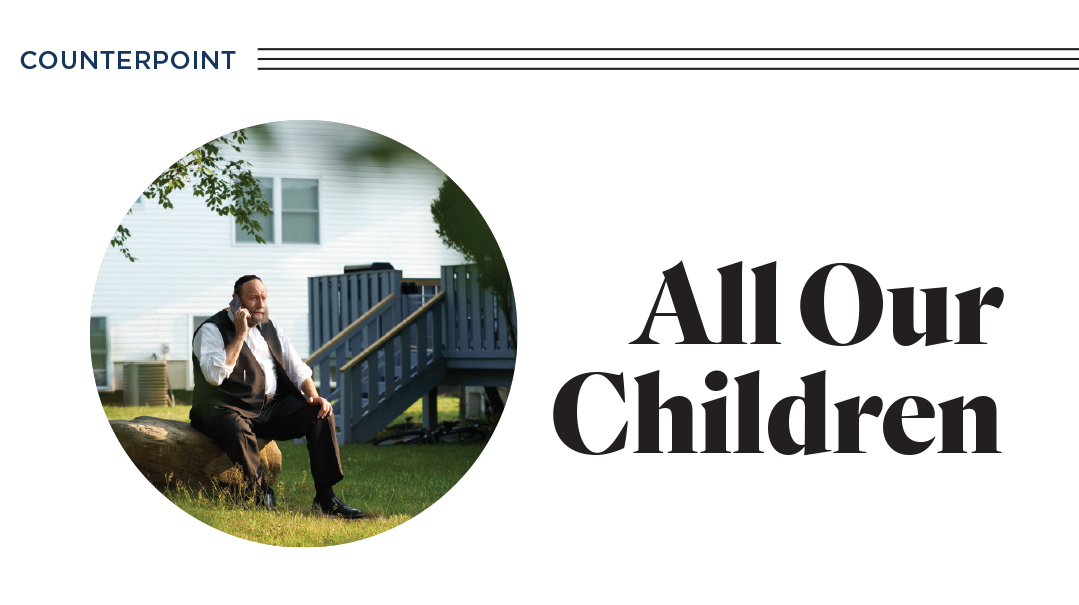Checks and Balances: II


Where It Starts and Ends — Rabbi Avrohom Weinrib, Cincinnati, OH
I was amazed at the breadth and depth of the issue dedicated to bnei Torah entering the workplace. It was truly a masterpiece and long overdue.
It brought to mind a recent meeting with a couple who were contemplating moving to our community from a larger East Coast city. We were talking about our community, and I shared with them that it’s mostly comprised of bnei Torah balabatim. The husband looked at me incredulously and said it was the first time he heard the idea of a ben Torah and a balabos being the same person. “Where I come from it’s one or the other,” he said. Baruch Hashem, they moved, and got to be part of community that truly understands and appreciates that a ben Torah balabos is not an oxymoron.
I believe it starts and ends with a true connection to learning. Our recently started Kinyan Hamasechta chaburah — one of the learning programs you featured in last week’s issue — has truly taken this concept to a new level. Imagine a balabos chazering 45 blatt over a bein hazmanim winter break. Imagine a wife telling her husband, “I’ll watch all the children on the plane so you can learn.” Imagine a wife calling that she has never seen her husband as happy and content since he started Kinyan Hamasechta. These are just a sampling from our chaburah, but reflect hundreds if not thousands of such stories from chaburahs across the globe.
If we can spread this model and keep the connection to Torah “on fire,” the idea of a ben Torah balabos will no longer be an anomaly.
The Real Dividing Line — Rabbi Betzalel Alpert and Rabbi Elchonon Jacobovitz, Monsey, NY
Kudos to Mishpacha for whisking the rug off a critical issue that has been nearing a breaking point for some time. The articles were all incisive, honest, and respectful, but Rabbi Neuberger’s article in particular really stood out for cutting through the symptoms down to ground zero — the chinuch that we give our children.
The postwar campaign to raise a new generation of Torah scholars from amid the ashes has succeeded beyond its initiators’ wildest dreams. Yet now, some 70 years later, it is time — as Rav Elya Brudny shlita so eloquently put it — for a correction. In our single-minded devotion toward replenishing our ranks, our chinuch has somehow lost its ability to provide the necessary space for those children not cut out for long-term kollel to develop into healthy, erlich balabatim.
When a system presents kollel, whether overtly or by way of omission, as the only viable path toward “making it,” the student who does not see himself as succeeding in that fashion is left with only two choices: viewing himself as a failure, or redefining success on his own terms, without any guidance or input from the Torah personalities in his life. When Torah learning is viewed through the prism of “career training” for kollel, those who have no interest in that career simply opt out. Why stay in medical school, goes the logic, if I don’t want to be a doctor?
If we are to succeed in raising proud, erlich balabatim who do not view themselves as failures, we must somehow convey the message that Torah is bigger than vocation, and that wherever and whoever you are, there is a portion of Torah waiting for you to claim as your own and integrate into your life. The dividing line is not between the learner and the earner, but between the one who has found a way to enjoy and be inspired by his learning, and the one who remains detached and apathetic.
We are currently in the process of establishing a yeshivah — with the strong rabbinical backing of Rav Elya Brudny shlita and others — where students are actively encouraged to identify their individual strengths, confront their future honestly, and prepare for successful integration of Torah learning and living in today’s “working” world. The particulars of our program — condensed sedorim, hashkafah classes, career-based electives, one-on-one learning with balabatim “mentors,” extracurricular activities, and so on — are not the most important part. We recognize that our program is certainly not the only path, and may not even be the best.
What is crucial, however, is to recognize that this is the new frontier, and to put it bluntly, we desperately need more people on the front lines.
Because of the Job, Not Despite It — Tzvi Broker, Career Consultant, Pilzno Work Inspired
As one who personally transitioned from being an avreich and rebbi to a career consultant, I almost couldn’t help myself from reading the whole edition on Checks & Balances before I got home. This was a significant contribution to this much-needed topic about working as a ben Torah and I wanted to share an angle that I feel stands at the crux of the discussion.
With its many challenges, the transition into the workplace can be experienced as the ascent of Yaakov’s ladder as he transitioned from the beis medrash into the period of work in his life. Commenting on this period of Yaakov’s life, the Midrash (Vayeitzei) teaches that “work is more precious than zechus avos.”
While Torah learning and adherence to mitzvos is the channel that powers the ruchniyus experience of work, Chazal highlight that work itself should be a ruchniyus experience, as it represents a partnership with Hashem in developing the world (Berachos 43b).
The opportunities for becoming a ben aliyah through one’s professional development expands into every type of profession, since one’s professional interests are deeply connected to his unique mission. (Gefen Poriah on source above). The Torah envisioned that one should find a sense of shleimus through his profession.
In my hundreds of conversations with bnei yeshivah and avreichim, I often find that many challenges are born from an assumption that professional success is desolate from ruchniyus. I’ve found empowering bnei Torah with a paradigm of the ruchniyus opportunity of work as a more effective approach than presenting it as a challenge to deal with.
As the Kotzker Rebbe taught, “G-d can be found where we let Him in.” We can strive to create a workforce of bnei aliyah through our belief of an integrated ascent of the ruchniyus and professional ladder.
The New Battle — Yoni Stavsky
Thank you for addressing the many challenges and concerns that working bnei Torah face, an important topic that needed to be addressed.
As a working ben Torah, there are a few points I would like to make.
- A life-altering decision such as leaving or overstaying one’s time in the beis medrash should only be made with consultation with daas Torah who knows the individual and his family well.
- The point was made that some working bnei Torah feel like “second-class citizens.” I don’t believe that any serious full-time learner would look down on someone who was advised by his rebbi/rav/rosh yeshivah that the ratzon Hashem is for him to go to work. If for some reason that has led to lowering his standards, such as having open Internet or movies in his home, then he has in effect lowered his own status.
- In the last generation, it took great mesirus nefesh to fight what was considered the social norm and learn in kollel. At the present time, the social norms have changed, baruch Hashem, and it’s considered normal to learn in kollel. I consider the new mesirus nefesh to be that of the working ben Torah. Where one has been compelled by circumstances to be out in the working world but doesn’t lower his standards, and even continues to shteig. That is the new, and in my opinion, under-appreciated mesirus nefesh.
May we all have much hatzlachah in doing Hashem’s ratzon.
The Age, Not the Stage — Ruchama Lefkowitz, Far Rockaway, NY
It is not surprising that yungeleit leaving kollel for the workforce are dealing with a whole host of emotional and identity issues. Every single young adult who leaves the familiar and comfortable environment they have known their whole lives asks questions. “Who am I?” “What is my relationship with Hashem?” “How do I negotiate staying connected when in a world not connected?” and “How am I unique and different as a frum Jew?” are questions I have seen most young adults ask themselves. Only, they ask at age 19–21, when they leave school and begin adult responsibilities.
These men are doing the same thing at a much later age, as they are only beginning adult responsibilities in their late twenties or early thirties. The emotional and spiritual upheaval is not unique to them, it is only unique that they are doing it at such a late age.
If You Love It, Share It — Miriam Zakon
Your theme issue on leaving kollel and remaining a ben Torah was timely and well done, but there was one glaring and unfortunate omission. Yes, there is a way of leaving kollel for a parnassah, while staying in the Torah world at the very same time.
Imagine a job where Erev Shabbos is Erev Shabbos, Yom Tov doesn’t come off vacation time, tzniyus is valued and observed. Imagine taking a job — a paid position — where Hashem’s Torah and doing His Will are the foundation of your company’s mission statement.
So why didn’t anyone suggest a career in chinuch or kiruv?
As a kiruv worker or mechanech, you will not get rich. You won’t be the cool guy being interviewed in frum magazines or the gevir being honored at a dinner (and Dov Haller might not even write about you in his serials). But you will live a life of Torah — and satisfaction. Mechanchim’s salaries have gotten more generous in past years, and there is always the possibility of earning extra income through running camps, getting involved in administration, tutoring, or even working part-time from the home in high-tech. Kiruv workers, too, can make salaries that they can live on, while bringing Hashem’s lost children back to Him.
Chinuch and kiruv are not for everyone, but if you love Torah, and love sharing it with others, it is a fine career choice. A choice that will let you remain a ben Torah all of your life — and enable you to create more bnei Torah every single day.
Drop the Labels — Aviva W.
Thank you for a professional, well-researched, and documented presentation on the transition from yeshivah to work. So many insights were spot on — especially the suggestion by Rabbi Neuberger to change the perceived degrading balabos designation to “Ben Torah who works.” Brilliant. If widely adopted, that alone could be a factor in mitigating so much of the shame and stigma associated with the transition.
One of your panelists referred to the importance of a wife always treating her husband like the king of his home, whether he is working or learning. While I appreciate her thought process, I find this framework to be self-limiting. If the husband is labeled the King and the wife is his Queen, the defined expectation associated with each of those roles might create more stress and less space for change, as well as limit the personal growth and development of each party involved.
We demand much of our leaders based on who we think they should be, how they should behave, and those demands often define our spoken and unspoken behaviors. What if the King is in the middle of finding himself in relation to the new demands of the workplace and needs his space, but his wife has defined expectations of him because he is the King? And what about her own self-development and identity — separate from her spouse. How does that work within this framework?
I propose that instead of affixing labels, which usually come with all sorts of expectations, spouses should give each other love, space, time, and respect without judgment as they navigate themselves within their new roles. Respect without judgment often leads to healthy communication that is volitional and without fear. Strong communication is foundational for any relationship.
And while working as a team and supporting each other is critical to a healthy home, I believe that a woman should identify her own needs, utilize her talents well, and nurture her own identity based on self-respect. The strength of character and confidence fostered by tending to herself and actualizing her talents will more likely enable her to better support her husband in a healthy, respectful, loving way while giving him space to find his niche and achieve his own self-actualization.
(Originally featured in Mishpacha, Issue 752)
Oops! We could not locate your form.





